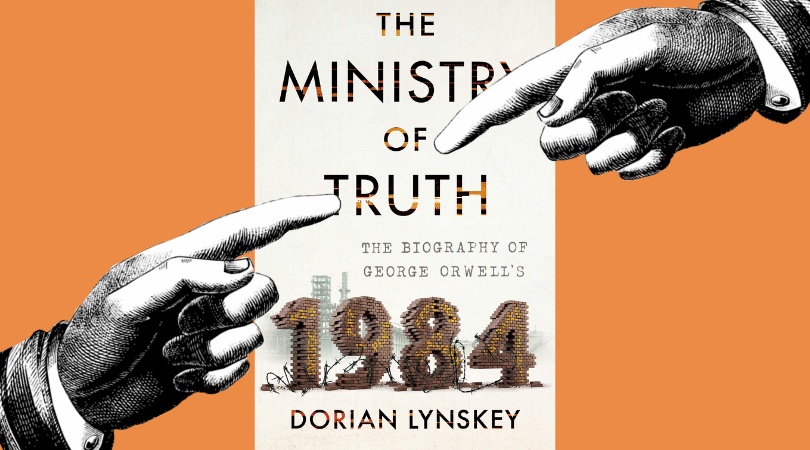
There are few things the literary community relishes more than the appearance of a polarizing high-profile book. Sure, any author about to release their baby into the wild will be hoping for unqualified praise from all corners, but what the lovers of literary criticism and book twitter aficionados amongst us are generally more interested in is seeing a title (intelligently) savaged and exalted in equal measure. It’s just more fun, dammit, and, ahem, furthermore, it tends to generate a more wide-ranging and interesting discussion around the title in question. With that in mind, welcome to a new series we’re calling Point/Counterpoint, in which we pit two wildly different reviews of the same book—one positive, one negative—against one another and let you decide which makes the stronger case.
It was George Orwell’s birthday earlier this week so we’ve got 1984 on the brain, and we’re not the only ones. In The Ministry of Truth, critic Dorian Lynskey reflects on Orwell’s infamous dystopian novel, its sources, its effect on the Cold War, and its far-reaching cultural influence today.
Overall, The Ministry of Truth has been met with positive reviews. The Guardian‘s DJ Taylor raved about this “highly astute study.” In The Times Literary Supplement, Margaret Drabble said, “Dorian Lynskey’s book amounts to a comprehensive survey of the history of utopia and dystopia, centring on Orwell’s immensely influential novel, and it is full of connections that make the reader’s mind spin off in all directions.” Shelf Awareness‘ Julia Kastner deems The Ministry of Truth “not only enthralling and research-rich, but often laugh-out-loud funny.” Some of the reviewers were more on the fence, including Lev Mendes who wrote, in The New York Times Book Review, “while we learn a great deal about the evolution and influence of 1984 as a cultural phenomenon, we sometimes lose sight, in the thick of Lynskey’s historicizing, of the novel’s intrinsic virtues.” Wendy Smith of The Washington Post had a similarly mixed review, claiming, “The problem isn’t Lynskey’s judgments, which are generally sound, but the rambling way he develops them and the odd tangents he wanders into.”
Today we’re looking at Kevin O’Kelly’s review in The Christian Science Monitor, which argues “this book is not what Orwell’s last and most famous novel deserves.” In the other corner, we have John Carey of The Times (UK), who praised the book as being an “astonishing cultural medley.”
So, what’s the (Ministry of) truth? It’s up to you, dear reader, to decide.
*
When George Orwell’s Nineteen Eighty-Four was published in the United Kingdom on June 8, 1949, in the heart of the twentieth century, one critic wondered how such a timely book could possibly exert the same power over generations to come.
“Unfortunately, despite some key insights and the wealth of history in its pages, this book is not what Orwell’s last and most famous novel deserves. The Ministry of Truth is a superficial, scattered account of the authors and books that provided a context for 1984 and the events that helped make Orwell the artist who could write it, with none of the depth that Orwell, his times, or the novel deserve. Lynskey commands an impressive knowledge of the literary culture of the period, which he puts on full display to provide a sense of the artistic cross-pollination that helped Orwell write his dystopian novel. However Lynskey’s passages on pre-1984 authors and speculative fiction will try the reader’s patience with their length and on occasion their irrelevance … Lynskey would have done better to write in more detail about the lived experiences that provided Orwell with material for 1984… The failures of The Ministry of Truth are doubly frustrating because Lynskey is clearly a talented writer … Unfortunately the better parts of The Ministry of Truth aren’t enough to redeem its flaws.”
–Kevin O’Kelly (The Christian Science Monitor)
“The first part inevitably repeats material from the voluminous commentaries on Orwell already in print. But it is freshly and powerfully argued … The second half of Lynskey’s book is richly informative, surveying the reception of Orwell’s novel decade by decade, and its adaptation … It makes for an astonishing cultural medley … Lynskey’s overall admiration is clear, but he sharply criticizes Orwell’s prejudices—his ‘kneejerk homophobia’ and his ‘thoughtless dismissal of feminism’ … If you have even the slightest interest in Orwell or in the development of our culture, you should not miss this engrossing, enlivening book.”
–John Carey (The Times (UK))
If you buy books linked on our site, Lit Hub may earn a commission from Bookshop.org, whose fees support independent bookstores.

